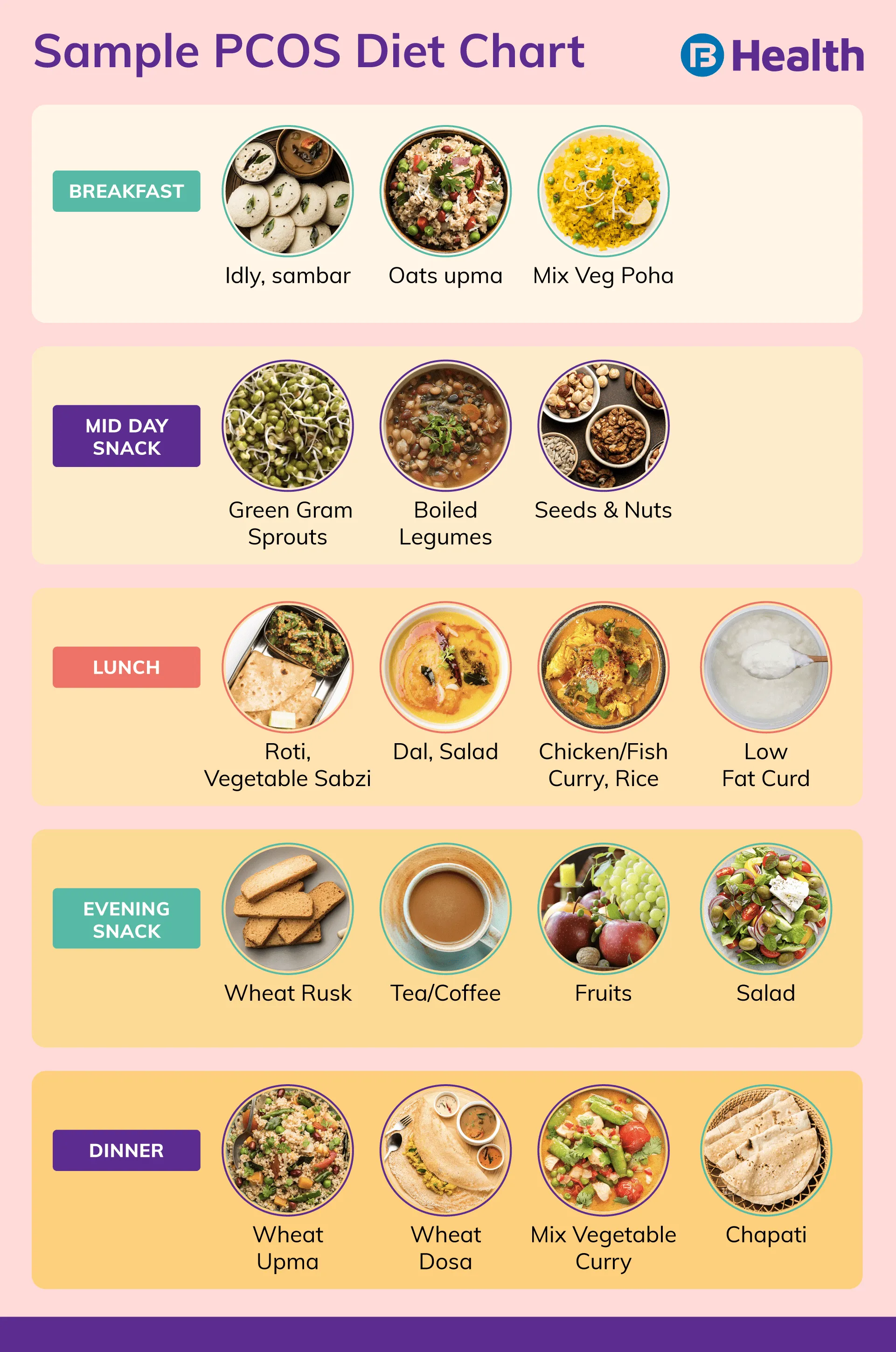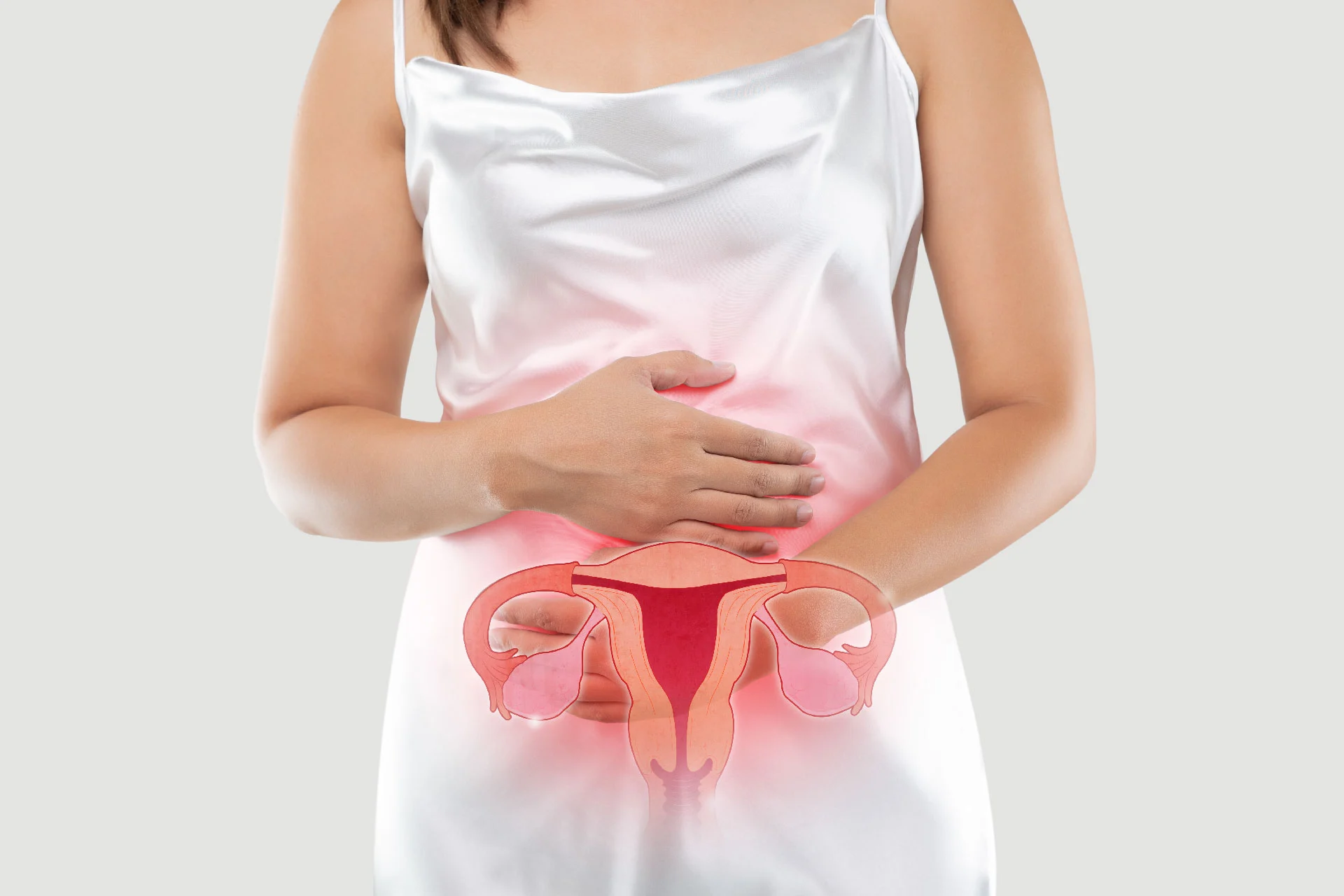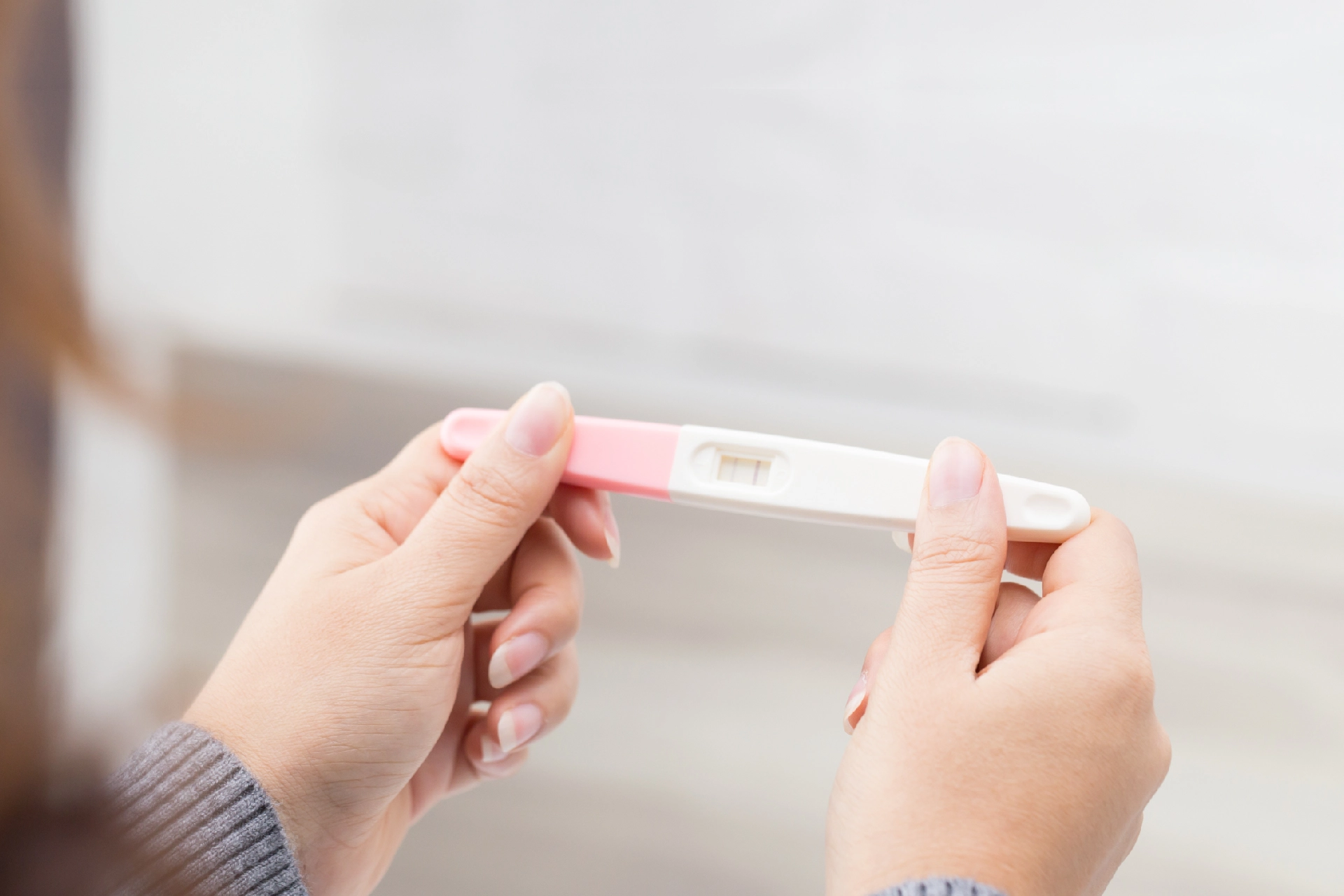Gynaecologist and Obstetrician | 8 min read
7 Day PCOS Diet Chart: Tips, What Foods to Eat and Avoid
Medically reviewed by
Table of Content
Key Takeaways
- Having PCOS with regular periods is common among adult women
- A balanced meal forms the basis of a sustainable PCOS diet chart
- It is important to have calcium for women who have PCOS symptoms
PCOS or polycystic ovary syndrome is one of the most common problems experienced by women. This condition affects your reproductive hormones resulting in an irregular menstrual cycle. The formation of multiple cysts in your ovaries may cause excess secretion of male hormones called androgens. If this condition is not managed on time, you may be at higher risk of developing diabetes, endometrial cancer and heart ailments. Following a PCOS diet chart plays a crucial role in its management. It not only helps you lose weight but also regulates your insulin levels. Increased insulin cause weight gain, fatty liver, and irregular menstrual cycle. Therefore, it is important to manage them by avoiding refined foods. This way you can keep a check on your PCOS condition. Here are a few tips of what you can include in your PCOS diet chart to manage your symptoms effectively.
Some typical symptoms of PCOS include [1]:
- Excessive growth of hair on face and body
- Unexplained weight gain
- Presence of acne
- Fertility issues
- Mood swings
- Loss of hair
- Pelvic pain
Diet Chart for PCOS Patient
When it comes to managing PCOS, following a specific PCOS diet plan can help immensely. An important thing to remember about a diet for PCOS is calorie intake. Your ideal intake will vary depending on your health factors. Be sure to consult your nutritionist before making any changes to your diet plan. Here is a 7-day PCOS diet plan that you can follow.
Day 1:
- Breakfast: 3 idlis with half a bowl of sambhar or one tablespoon of green chutney or one boiled egg
- Pre-lunch snack: 1 cup of green gram sprouts or eight walnut halves
- Lunch: Fish/ vegetable curry with three rotis, half cup of cabbage subji, and half a bowl of salad
- Evening snack: Fruits that have a low GI (apples, grapefruits, strawberries, oranges, or cherries)
- Dinner: Roasted chana dal with wheat dosa, or half bowl of tomato subji with two rotis
Day 2:
- Breakfast: Vegetable oats or millet (nachani) dosa with green chutney and sugar-free coffee/tea
- Pre-lunch snack: Fruits low in GI (mentioned on day 1)
- Lunch: Brown rice with dal, curd, and beetroot poriyal, or one cup pulav with a half cup of buttermilk and curry made from soya chunks
- Evening snack: One boiled egg with soup made from roasted tomato, or a cup of light tea with two wheat rusks
- Dinner: Vegetable kurma or okra subji with 2-3 rotis and salad
Day 3:
- Breakfast: One cup of upma made from daaliya, vegetables, and sugar-free coffee or tea
- Pre-lunch snack: Half a bowl of boiled channa (black)
- Lunch: Chicken and appam or pulav made from brown rice with some raita
- Evening snack: Fruits low in GI (mentioned on day 1)
- Dinner: One bowl of egg or paneer curry with a multigrain roti and curd or vegetables and besan chilla
Day 4:
- Breakfast: Methi paratha and one teaspoon of green chutney or omelette made from egg whites and veggies with whole wheat bread
- Pre-lunch snack: Fruits low in GI (mentioned on day 1)
- Lunch: Chicken curry with 150gms of chicken with one bowl of rice and cucumber salad or khichdi made from brown rice, vegetables, and oats
- Evening snack: Hummus and carrot sticks or carrot soup and one boiled egg
- Dinner: Half a bowl of bitter gourd (karela) with three small wheat dosa

Day 5:
- Breakfast: Upma made from vegetable oats and half a cup of milk low in fat
- Pre-lunch snack: One cup of grilled or raw vegetables with plain yogurt
- Lunch: Vegetable curry and methi thepla with curd salad
- Evening snack: One cup of light tea and one bowl of boiled channa
- Dinner: One bowl of brown rice with mushroom or chicken curry, and one bowl of curd and salad or mixed vegetable curry with two rotis
Day 6:
- Breakfast: the Gobi and broccoli paratha or one bowl of vegetable poha with one glass of low-fat milk
- Pre-lunch snack: Fruits low in GI (mentioned on day 1)
- Lunch: Stir-fry spinach, brown rice, and moong sprouts with curd
- Evening snack: One cup of sugar-free tea or coffee with one bowl of sprout salad or two biscuits
- Dinner: Half bowl of ridge gourd (toree) subji and two rotis or sautéed tofu/chicken with vegetables and soup made from broccoli and almond
Day 7:
- Breakfast: Upma made from quinoa or vegetables
- Pre-lunch snack: One bowl of boiled channa or one egg (boiled)
- Lunch: Chicken pulav and raita, or one bowl of brown rice with rajma and raita
- Evening snack: Fruits low in GI (mentioned on day 1) or Buttermilk and nuts
- Dinner: Khichdi made from moong, bajra, and peas or grilled paneer/fish with sautéed vegetables and spinach soup
You can also modify the above diet plan and turn it into a PCOS diet chart for weight loss. You can contact your nutritionist to ensure that the food in your PCOS diet plan is the best for you.
Foods to Consume in PCOS
Your diet for PCOS should comprise foods that can help you manage your symptoms and improve your health. A PCOS diet plan also helps your form healthy eating habits, which is why your food list should have some of the healthiest foods. Here is a list of foods that you can consume to manage PCOS.
- Lean protein to keep you full for a longer period: This includes salmon, tofu, beans, and shrimp
- Carbohydrates high in fiber lower insulin levels and inflammation: These include brown rice, quinoa, lentils, white potatoes, peas, oats, lentils, and beans
- Fats that are good for your heart: These include avocado, chia, almonds, olive oil, walnuts, sunflower, cashews, and flax
- Anti-inflammatory foods to prevent obesity and boost immunity: These include beets, berries like strawberries or raspberries, tomatoes, apples, asparagus, and broccoli
- Wholegrains to manage your insulin levels and prevent diabetes: These include foods high in fiber such as wholegrain rice or dried fruit
- Unprocessed and natural foods: These include spices such as cinnamon, turmeric, garlic, ginger, saffron, cumin, cloves, and black pepper
- Foods with high content of selenium: These include salmon, tuna, turkey, pork, eggs, fortified whole grains, spinach, and cottage cheese
- Green leafy vegetables to increase intake of vitamin B: These include kale, spinach, cabbage, lettuce, and other green veggies
- Foods consumed as part of the DASH diet: These include dairy products, fruits, vegetables, grains, fats, and nuts
Avoid these Foods to Get Rid of PCOS
Along with knowing what foods you should consume in your diet for PCOS, you should also know what to avoid while following your PCOS diet plan. This will help you ensure that you do not consume anything that would aggravate your symptoms. Here is a list of what you should not include in your PCOS diet plan.
- Starchy vegetables that can increase your sugar levels and lead to hormonal imbalance: These include foods like yam, corn, sweet potato, and squash (pumpkin, edible gourds, and other vegetables of the cucumber family)
- Foods and drinks with added sugar can increase your blood sugar levels: These include fruit juices and canned and processed food.
- Desserts and fast foods to reduce sugar and unhealthy fat intake: These include foods like burgers, fries, cakes, ice cream, and cookies
Tips to Create PCOS Diet Chart
1. Consistent with Meal Routine
When you are struggling with PCOS, you may not always experience irregular periods. It is common to get PCOS with regular periods as well. It is better to check with your gynecologist if you notice any unusual PCOS symptoms like PCOS hair loss. The first and foremost thing you need to tackle here is your eating pattern. Ensure that you take meals regularly and on time and follow PCOS diet plan.
If you skip a meal, your blood sugar levels may decrease. It can result in overindulgence and binge eating. Following a proper routine for meals can help in stabilizing your blood glucose levels. With proper regulation of sugar levels, there is no excessive production of androgen hormones. This means your PCOS symptoms will be less severe. For better regulation of sugar levels, eat small portions frequently.
2. Eat a Wholesome and Balanced Diet
It is necessary that you consume a diet with a proper balance of all essential nutrients. This can help your body stay in a homeostatic state. This means that your body’s internal vitals remain constant despite the changing external conditions. This is highly important for the optimal functioning of any living organism.
When your diet is balanced, the insulin hormone functions properly and allows glucose to enter blood cells. This provides energy to your body. Consequently, a decrease of insulin in your blood can reduce the production of androgens. This can help ease PCOS symptoms.
Additional read: Nutrition Concepts of a Healthy Diet3. Add Vitamins and Minerals in Diet
When you are choosing a diet plan, stick to vitamins and minerals. These are called protective foods, and are vital for the proper functioning of your body. Studies reveal that including foods rich in vitamins and minerals can increase your insulin resistance. This way, you can reduce the severity of your PCOS symptoms drastically. Having calcium for women with PCOS is a must. Such foods are essential for the production of eggs apart from increasing your bone density [2]. Be it vitamin D or E, deficiency of these micronutrients can worsen your PCOS symptoms.
4. Avoid Refined Carbohydrates and Sugar
Refined carbohydrates like white bread and biscuits are a big no for women’s wellness. These carbs increase triglyceride and blood sugar levels. They can cause insulin resistance, which further affects the production of androgens. These carbs can also increase the risk of other health ailments like diabetes and heart disease. Avoid having sugary beverages too as these can increase your blood insulin levels.
5. Include seeds in Diet
Seeds contain nutrients such as:
- antioxidants
- vitamins
- omega-3 fatty acids
- minerals
- protein
- fiber
Including these superfoods in your diet is very beneficial. Since seeds contain less carbs, your insulin levels do not increase. You can consider including flax, sunflower, sesame, chia, hemp, and pumpkin seeds in your diet [3]. Have them raw or add them your smoothies and salads!
Additional read: Health Benefits of Chia SeedsApart from making these dietary changes, exercise regularly for 30 minutes to maintain your weight. Start yoga for PCOS for a healthy lifestyle. Leading a healthy and active lifestyle forms the basis for PCOS management. For proper medical advice on PCOS, you can connect to reputed gynecologists on Bajaj Finserv Health. Book an online doctor appointment and address your PCOS symptoms without delay.
References
- https://medlineplus.gov/polycysticovarysyndrome.html
- https://www.ncbi.nlm.nih.gov/pmc/articles/PMC6250088/
- https://link.springer.com/chapter/10.1007/978-3-642-23394-4_13
Disclaimer
Please note that this article is solely meant for informational purposes and Bajaj Finserv Health Limited (“BFHL”) does not shoulder any responsibility of the views/advice/information expressed/given by the writer/reviewer/originator. This article should not be considered as a substitute for any medical advice, diagnosis or treatment. Always consult with your trusted physician/qualified healthcare professional to evaluate your medical condition. The above article has been reviewed by a qualified doctor and BFHL is not responsible for any damages for any information or services provided by any third party.





